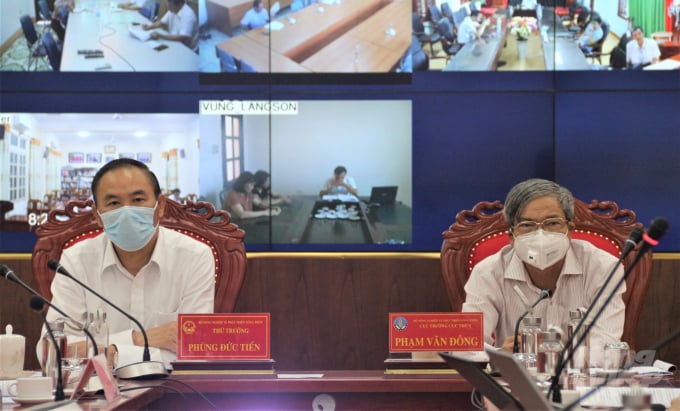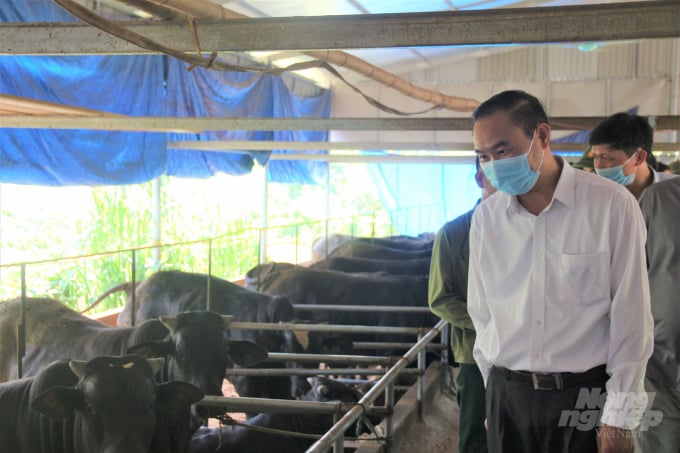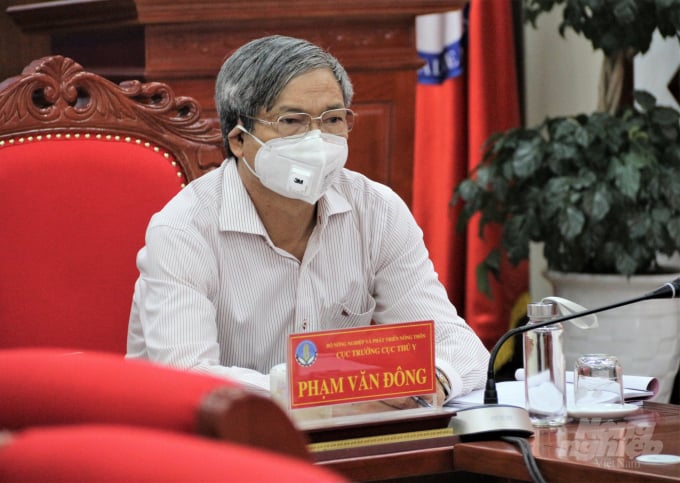May 21, 2025 | 07:20 GMT +7
May 21, 2025 | 07:20 GMT +7
Hotline: 0913.378.918
May 21, 2025 | 07:20 GMT +7
Hotline: 0913.378.918

Deputy Minister Phung Duc Tien and Director General Pham Van Dong chaired the conference. Photo: Pham Hieu.
While Covid-19 is still causing difficulties and developing complicatedly, Vietnam has had to deal with diseases on crops, terrestrial animals and fishery products. Over the past time, the amount of diseases has increased because Vietnam deeply integrates into the region, not to mention its long border, full of trades and tourism activities. According to statistics, the damage caused by the epidemic in the first 6 months of the year was nearly USD 39 million.

In accordance with Deputy Minister Phung Duc Tien, the responsibility of those who do veterinary work is very heavy but also very honorable. Photo: Pham Hieu.
Deputy Minister Phung Duc Tien suggested that the Department of Animal Health, in coordination with research agencies and businesses, urgently research vaccines to actively prevent avian influenza epidemics, because vaccines are required in order to prevent viral diseases.
Regarding lumpy skin disease on buffaloes and cows, Deputy Minister Phung Duc Tien asked provinces and cities to allocate budgets for vaccination. If the veterinary work is not secured, the livestock industry in the locality will be very difficult to grow. Moreover, the management of vaccines and veterinary drugs must be carefully supervised, closely to reality.

Deputy Minister of Agriculture and Rural Development affirmed the importance of vaccines in the prevention of livestock diseases. Photo: Pham Hieu.
According to Mr. Pham Van Dong, Director of the Department of Animal Health, the disease prevention in cattle and poultry in the first 6 months of the year has been well executed. The number of destroyed livestock due to the disease has increased, but decreased in comparison to the total herd. Therefore, the output of livestock and poultry meat has increased by nearly 23% over the same period in 2020.
In addition, the area of disease on aquatic products has decreased greatly, aquaculture production increased by 4.1% over the same period in 2020.
According to Director General Pham Van Dong, in order to achieve the goals of the last 6 months of the year, which also serves as a premise for development in the coming years, the veterinary industry will have more drastic, stronger, deeper and more specific solutions, especially in the remaining period of the year due to the increased demand for livestock, trading and slaughtering. In particular, especially promoting good prognostications about epidemics and outbreaks, early detecting and treating, and proactively publicizing the effectiveness of vaccines...

Director General Pham Van Dong emphasized that the veterinary industry needs more drastic, stronger, deeper and more specific solutions in the coming time. Photo: Pham Hieu.
In the remaining 6 months of the year, the Department of Animal Health will continue to monitor the animal disease situation, especially dangerous diseases in livestock, continue to send delegations to urge and guide localities to carry out epidemic prevention and control work.
At the same time, the Department of Animal Health will organize the effective implementation of national programs and plans on the prevention and control of dangerous diseases approved by the Prime Minister. The MARD has also given many directions. Concentration is simultaneously required to build chains and livestock production areas at district and inter-district levels, especially for poultry, pigs and dairy cows, ensuring disease safety to serve domestic consumption and export.
In the meantime, the Department of Animal Health must strengthen international cooperation for in-depth research on virus characteristics, isolation cultivation, gene sequencing, research and vaccine production...
According to Ngo Van Bac, Acting Director of the Central Animal Health Diagnostic Center (Department of Animal Health), in the first six months of 2021, the Center has tested 38,000 Covid-19 samples, equivalent to nearly 120,000 people, and detected two positive cases, traced 3 other positive cases. All positive cases are contagious in the community, if not detected in time, they will spread and cannot be traced. The Center's Covid-19 testing activities have greatly supported the health sector in the fight against Covid-19.

(VAN) In 2024, over 295 million people across 53 countries and territories faced acute hunger—an increase of almost 14 million people compared to 2023, while the number of people facing catastrophic levels of hunger reached a record high.

(VAN) World Environment Day 2025 (June 5) carries the theme 'Beat Plastic Pollution' continuing to emphasize the global urgency of addressing the plastic waste crisis.

(VAN) This was the assessment shared by experts at the workshop titled 'Assessing the Role and Potential of Low-Emission Rice Production Systems in Vietnam,' held on the morning of May 19.

(VAN) Cai Rong Port is the fisheries control center of Quang Ninh, helping to monitor fishing vessels, combat IUU fishing, and remove the EC's 'yellow card'.

(VAN) The German Agricultural Society (DLG) explores the possibility of establishing a mechanization service center in Vietnam’s Mekong Delta to support farmers in accessing and utilizing advanced machinery.

(VAN) On May 16, the Department of Water Resources Management, in collaboration with the Food and Agriculture Organization of the United Nations (FAO), held a signing ceremony for the GEF-8 project document.

(VAN) Food safety, mechanization, vocational training, and market opening are key areas of cooperation expected between the Vietnamese Government and the Federal Republic of Germany.